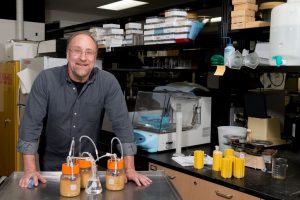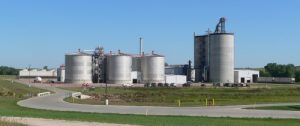University of Wisconsin-Madison professor James Steele has engineered and patented a new bacteria that aids in ethanol production. The Winder Bascom professor of food science specializes in food, beverage and biofuel fermentation and as such seen first hand how during the fermentation process beer and wine can often be contaminated with lactic acid bacteria. When this occurs lactic acid is produced rather than alcohol. This same problems, says Steele, affects the ethanol industry whose company, Lactic Solutions, is using genetic engineering to transform adversary into a friend.

UW-Madison food science Professor James Steele with homemade fermenters he’s using to explore genetic engineering of lactic acid bacteria, a common contaminant of many fermentation processes, including cheese, wine, beer and biofuel production. PHOTO: SEVIE KENYON
In Steele’s process, rather than killing lactic acid bacteria with antibiotics, a common approach in the ethanol industry today, he is splicing in genes for ethanol production. When he does this, these organisms, traditionally foes, become allies and produce ethanol instead of lactic acid.
“We are taking the problem and trying to turn it into a solution,” Steele says. The company will sell bags of bacteria to the ethanol industry to be added to the fermenter alongside the yeast that presently makes ethanol.”
General antibiotic resistance is a global concern and some groups are concerned with traces of antibiotics in foods. In the case of ethanol – where nearly 70 percent of biorefineries use antibiotics to fight lactic acid bacteria while some ethanol plants use hops – this could be a concern because a co-product of ethanol production is distillers grains (DDGs) – a common feed for animals.
“Distillers grains can carry antibiotics or bacteria that evolved in the fermentation facility to resist antibiotics,” says Steele who adds the result could be dangerous drugs, or rather dangerous bugs, in the human food supply chain.“Tyson Foods, McDonald’s, Panera, Perdue, etc. say they will, by the end of this year or next year, eliminate the use of meat from animals fed antibiotics, so the primary way to control lactic acid bacteria in the ethanol industry is going away.”

The Siouxland ethanol plant west of Jackson, Nebraska. An invention at UW–Madison may improve fermentation results while reducing the hazard of antibiotic resistance. PHOTO: AMMODRAMUS/WIKIMEDIA COMMONS
Steele explains that the engineered bacteria must reproduce and be able to survive rising levels of ethanol in the fermenter. They should also be introduced as early as possible during the fermentation phase. His reformulated lactic acid bacteria have received a gene that produces inhibitors of garden variety lactic acid bacteria, which uses “the same systems they have evolved to compete against each other over millions of years. We want to give our organisms every advantage.”
Another discovered benefit of his new bacteria? It consumes types of sugar that are not available to the yeast. “At the end of the day, there is more ethanol produced from the same amount of corn,” Steele says, “but we would have never found this if we had not started trying to solve the antibiotics problem.”
Steele adds that he knows his competitors – there are nearly 200 first-generation ethanol plants in the U.S. with the majority located in the Midwest. The ethanol industry, Steele says, “understands that antibiotics are a short-term solution, and we plan to provide them with a long-term solution that also increases conversion of sugars to ethanol. Hops are way more expensive and less effective than antibiotics. We think we can do much better for less.”

